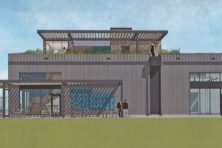ATC Settlement Paves Way for Terrace Development to Move Forward
- Share
- Tweet
- Pin
- Share

The Sturgeon Bay Common Council agreed to a settlement Nov. 1 to have American Transmission Company (ATC) pay reimbursements totaling more than $230,000 related to the company misrouting a high-voltage power line on the city’s West Waterfront.
The damage award involves ATC not routing the power line in the specific area where the city granted an easement near the west end of the Maple-Oregon Street Bridge, thereby limiting the amount of buildable space where Peter Gentry of WWP Development could construct a mixed-use building known as the Sturgeon Bay Terrace with a beer taproom and deli. Gentry is the founder of One Barrel Brewing Co., which operates a taproom in Egg Harbor.
The power line was routed under the bay of Sturgeon Bay to connect to an electrical substation on the city’s east side.
City Administrator Josh VanLieshout said most of the costs to move the building’s footprint so that it could be constructed on the site will be incurred by the developer, who will receive $162,250, and the city’s costs related to the misrouted power line come to $69,700.
“ATC is willing to acknowledge the city’s and the developer’s costs and work to reimburse those expenses,” he said. “In light of just the nature of who’s incurring the costs, it’s reasonable that the city share that reimbursement with the developer.”
VanLieshout said community development director Marty Olejniczak discovered that the power line had been misrouted near the west end of the Maple-Oregon Street Bridge after reviewing the legal description of the line’s location provided by ATC.
“I think we all realized pretty quickly that abandoning the newly constructed bay crossing [for the power line] isn’t the solution to this kind of problem, so we summarized what we thought our costs would be, what we thought the developer’s cost would be after consulting with the developer, and shared those with ATC,” VanLieshout said. “ATC essentially agreed in principle to these amounts.”
He said the developer-incurred costs to relocate the building were determined by the developer and his architect to be $111,750, and the city’s incurred expenses came to $10,000.
In addition, VanLieshout said economic costs due to a reduction in buildable area and a loss of value of outdoor improvements, namely seating, were calculated at another $50,500 for the developer, while the city’s estimated loss of tax incremental financing (TIF) revenue and forgone tax revenue from the outdoor improvement came to another $59,700.
“One of the nice things about doing business in a small town is it’s easy to communicate with our developers,” he said. “We’ve been working with them for a couple of years now, and they’re on board.”
VanLieshout said the city’s reimbursements will be placed into Tax Incremental District (TID) No. 4 because they are TID-incurred expenses.
After all the hurdles the Sturgeon Bay Terrace project has faced, Gentry said he expects to start construction in the spring.


